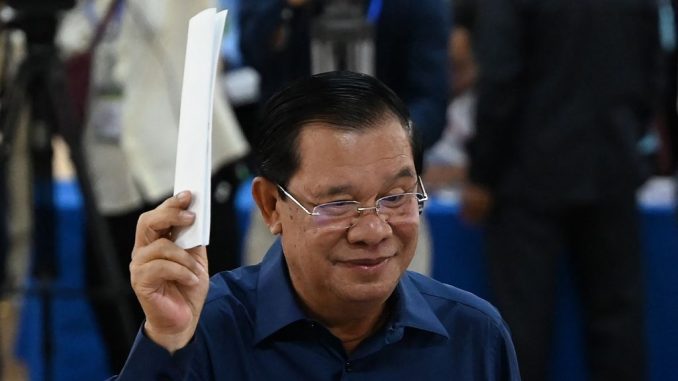
Hun Sen’s Succession Plan
Cambodian Prime Minister Hun Sen, who has been in power for 38 years, steps down and nominates his son as successor. He will remain active as party leader and member of parliament, he announced in a television speech. The transfer of power must take place within three weeks. The son of the current prime minister, 45-year-old Hun Manet, is still the commander of the army.
Controversial Election Victory
On Sunday, the Cambodian People’s Party of the 70-year-old prime minister claimed victory after parliamentary elections. Western countries and human rights organizations speak of a mock election because the main opposition parties have been banned by the government. However, international observers from Russia and China, allies of the Cambodian prime minister, were present.
Hun Sen’s Political Background
In the 1970s Hun Sen was active as a soldier and battalion commander for the Khmer Rouge, the totalitarian regime of dictator Pol Pot. Under his regime, some 2 million Cambodians were killed, at the time a quarter of the entire population. Hun was wounded and permanently blinded in one eye in the fighting around the capital Phnom Penh.
Hun denies involvement in the genocide: he says he had stopped following orders. In 1977 he fled to Vietnam with his battalion, fearing the internal purges carried out by the Khmer Rouge. There he helped prepare an invasion of his homeland. As one of the leaders of the Vietnamese rebel army, he fought against the Khmer Rouge. After the fall of Pol Pot, Hun Sen became the youngest foreign minister in the world in 1979 at the age of 26.
Torture and Coup
Six years later, he began his first term as prime minister. In 1987 he came under international scrutiny. Amnesty International accused his government of torturing political opponents, including electric shocks. In 1993 he lost the elections and was forced to cooperate with opposition leader and Prince Norodom Ranariddh. Initially things went reasonably well, until tensions arose that led to a coup d’état in 1997 that brought Hun Sen to power. Opposition party ministers were summarily executed.
Hun Sen’s Autocratic Rule
Hun Sen has not let go of power to this day. Over the past decade, his policies have become more autocratic. He severely restricted press freedom and silenced opponents of his regime. Earlier this year, opposition leader Kem Sokha was sentenced to 27 years in house arrest. He would have been guilty of high treason.

Be the first to comment